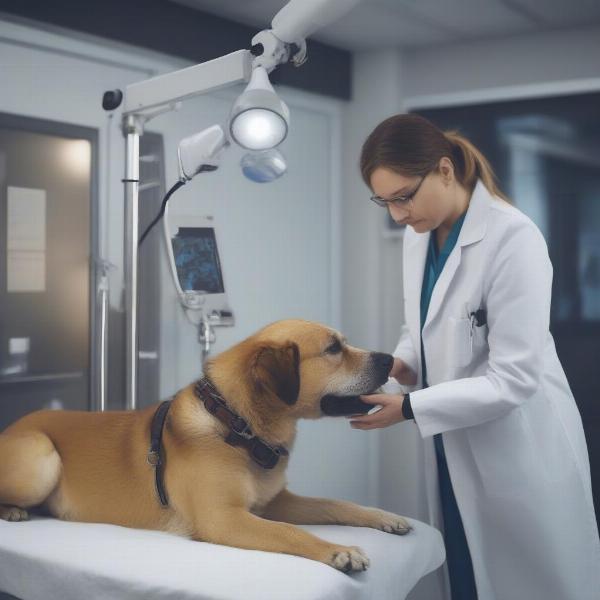Do dogs sleepwalk? It’s a fascinating question that many dog owners ponder. While we often associate sleepwalking with humans, can our canine companions experience this nocturnal phenomenon too? This article delves into the science behind canine sleep and explores whether dogs truly sleepwalk, or if their nighttime wanderings are caused by something else entirely. We’ll examine common dog sleep behaviors, potential reasons for nighttime activity, and offer advice on how to help your furry friend sleep soundly.
Understanding Canine Sleep Cycles
Like humans, dogs experience different stages of sleep, including REM (rapid eye movement) and non-REM sleep. During REM sleep, dogs may twitch, whimper, or even appear to be running in their dreams. This is perfectly normal and doesn’t indicate sleepwalking. Non-REM sleep is a deeper, more restful state. It’s during this deeper sleep phase that sleepwalking, if it occurs, would likely happen.
What Does Canine Sleepwalking Look Like?
True sleepwalking in dogs would involve complex movements, such as walking around, navigating obstacles, and perhaps even engaging in behaviors like eating or drinking while still asleep. However, such behavior is exceptionally rare in dogs, and often what appears to be sleepwalking is actually another sleep-related phenomenon.
Common Causes of Nighttime Activity in Dogs
Several factors can contribute to a dog’s nighttime restlessness, which might be misconstrued as sleepwalking. These include:
- Age: Puppies and senior dogs are more likely to experience sleep disruptions. Puppies are still developing their sleep patterns, while older dogs may suffer from cognitive decline or medical conditions that affect sleep.
- Medical Conditions: Certain medical issues, such as seizures, anxiety, or pain, can cause nighttime pacing or restlessness.
- Environmental Factors: A noisy or uncomfortable sleeping area can disrupt a dog’s sleep. Make sure your dog has a quiet, dark, and comfortable place to rest.
- Stress or Anxiety: Just like humans, dogs can experience stress and anxiety, which can manifest as nighttime restlessness.
- Incomplete House Training: If your dog hasn’t fully grasped house training, they might wake up at night needing to go outside.
Is It Really Sleepwalking? Or Something Else?
While true sleepwalking is highly uncommon in dogs, nighttime wandering can be a sign of an underlying issue. If your dog exhibits unusual nighttime behaviors, it’s essential to consult a veterinarian. They can help rule out any medical conditions and provide guidance on managing your dog’s sleep.
What to Do if Your Dog Seems to Be Sleepwalking
- Observe and Document: Note the specific behaviors your dog exhibits at night, the frequency, and any accompanying symptoms. This information will be helpful for your veterinarian.
- Veterinary Check-up: Schedule an appointment with your vet to discuss your dog’s nighttime activity. They can perform a thorough examination and recommend appropriate diagnostic tests if necessary.
- Create a Calm Environment: Ensure your dog has a quiet, comfortable, and secure sleeping area.
- Establish a Routine: A regular sleep schedule can help regulate your dog’s sleep patterns.
 Dog at Vet Check-up
Dog at Vet Check-up
Conclusion
While the idea of dogs sleepwalking is intriguing, it’s crucial to distinguish between true sleepwalking and other forms of nighttime activity. By understanding canine sleep cycles and potential reasons for restlessness, we can better address our furry friends’ needs and ensure they get a good night’s rest. If you’re concerned about your dog’s sleep, don’t hesitate to seek professional advice from your veterinarian.
FAQ
- Do dogs dream? Yes, dogs experience REM sleep, which is associated with dreaming.
- Why does my dog twitch in its sleep? Twitching during sleep is usually a normal part of REM sleep and is often associated with dreaming.
- How much sleep do dogs need? Dogs need varying amounts of sleep depending on their age, breed, and activity level, but generally, they sleep for 12-14 hours a day.
- What can I do if my dog has trouble sleeping? Creating a calming bedtime routine, providing a comfortable sleeping area, and ensuring sufficient exercise can help improve your dog’s sleep.
- When should I be concerned about my dog’s nighttime activity? If your dog displays unusual behaviors like pacing, disorientation, or vocalization during the night, it’s best to consult a veterinarian.
- Can medications help my dog sleep? In some cases, a veterinarian may prescribe medication to help manage underlying conditions that contribute to sleep problems.
- Is sleepwalking dangerous for dogs? While rare, if a dog is truly sleepwalking, it could potentially injure itself by bumping into objects or falling.
ILM Dog is a leading international dog website dedicated to providing expert advice on all aspects of dog care and wellbeing. From breed selection to health, training, nutrition, and grooming, we offer a wealth of resources for dog owners worldwide. Our aim is to empower you with the knowledge and tools you need to provide the best possible care for your canine companion. Whether you’re a seasoned dog owner or just starting your journey, ILM Dog is your trusted source for reliable and practical information. For expert advice and personalized support, contact us via email at [email protected] or call us at +44 20-3965-8624. Let ILM Dog help you navigate the wonderful world of dog ownership!